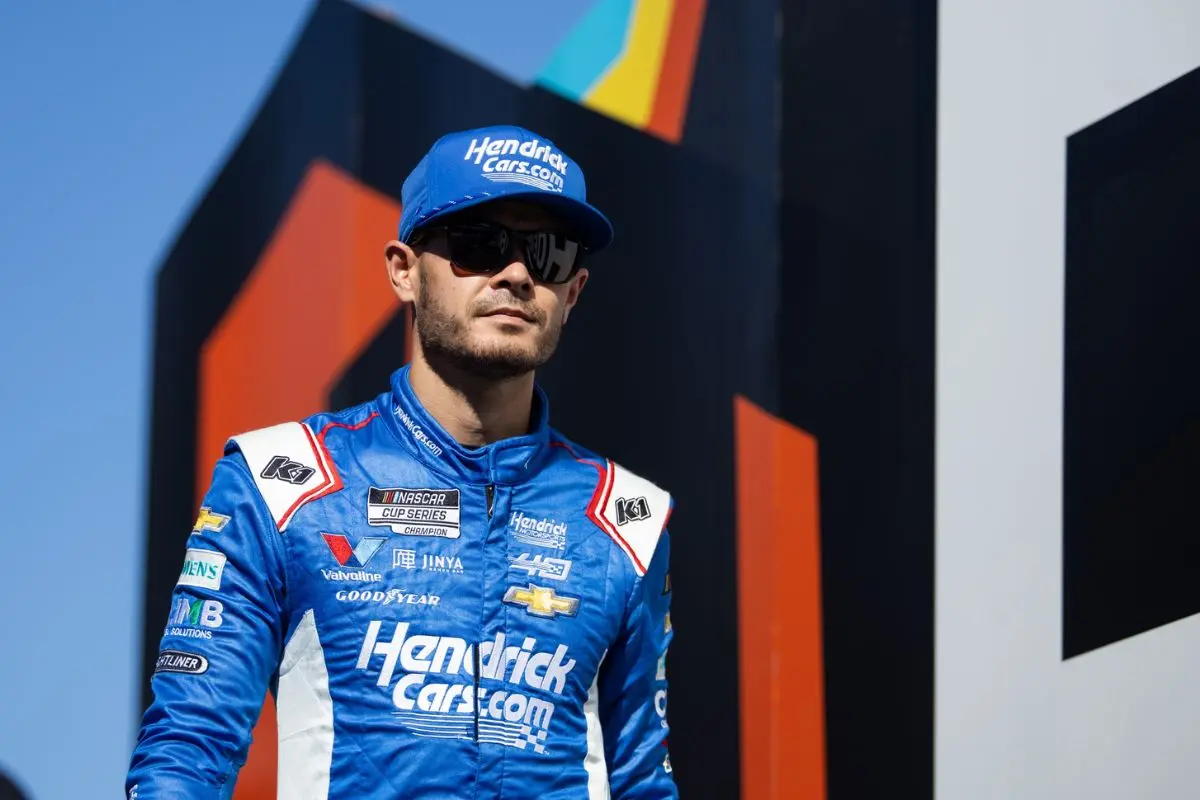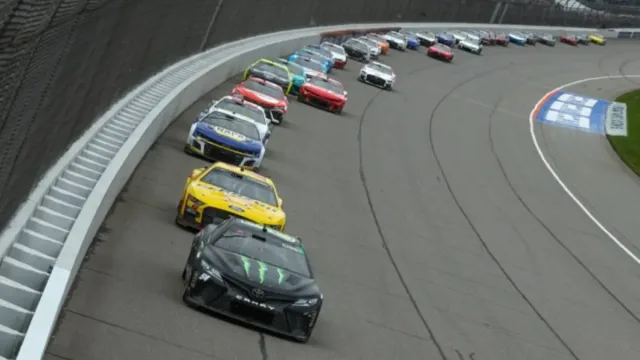NASCAR’s ‘discouraging’ attempts for its drivers have caught the attention of fans and teams. With new rule changes in place, drivers now face tougher decisions that could affect their playoff hopes. What do these changes mean for the future of NASCAR? The mystery is building as we explore how this new direction could shake up the sport.
Key Highlights
- The “Kyle Larson Rule” enforces a loss of all NASCAR playoff points for drivers missing a race, without a waiver.
- This rule prioritizes NASCAR events over external competitions, emphasizing driver commitment and consistency throughout the season.
- Missing a race without a waiver could start drivers at a base of 2,000 NASCAR playoff points, affecting their competitive stance.
- Waivers for medical or family reasons are exceptions, sparking debates over fairness and enforcement consistency.
- The rule aims to uphold competitive fairness, although it faces mixed reactions regarding its severity and potential impact on drivers.
The Birth of the “Kyle Larson Rule”
Following Kyle Larson’s audacious attempt at the Indianapolis 500-Coca-Cola 600 doubleheader, NASCAR has introduced the “Kyle Larson Rule,” a significant improvement to its rulebook. This regulation, born out of the intense scrutiny following Larson’s high-profile endeavor, emphasizes NASCAR’s commitment to maintaining the integrity and competitiveness of its racing series.
The unprecedented move by Larson, which saw him tackle two of motorsport’s most grueling events in a single day, highlighted potential risks and logistical challenges that led NASCAR to reevaluate its existing rules.
The “Kyle Larson Rule” is the result of careful deliberation within NASCAR’s governing body, aimed at addressing the complexities of scheduling and the demands placed on drivers. By instituting this rule, NASCAR seeks to guarantee that all drivers remain fully committed to their participation in the series, mitigating any disruptions that might arise from competing in external events.
The introduction of this rule reflects NASCAR’s proactive approach to preserving the competitive balance of its NASCAR playoffs. By potentially penalizing drivers who attempt similar doubleheader feats, NASCAR sends a clear message about the importance of dedication to its series.
This rule is designed not only to protect the interests of the sport but also to safeguard the well-being of its participants. Therefore, the “Kyle Larson Rule” stands as an indication of NASCAR’s evolving landscape, adapting to the dynamic nature of modern motorsport.

What Is the ‘Kyle Larson Rule’?
This rule highlights NASCAR’s commitment to maintaining the integrity and competitiveness of its championship by dissuading drivers from participating in overlapping events.
“Well, while NASCAR has decided to encourage those from other series coming over to their circuit, they’ve also just decided to double down on discouraging their drivers from racing other series in a way that would skip one of their events. Maybe this is sort of the Kyle Larson rule.”
“You better not leave. Or else you need a waiver for that.” – jeff gluck
The introduction of this rule signifies a crucial moment in NASCAR’s regulatory history, aligning with a broader strategy to balance inclusivity with rigorous standards for its drivers.
Kyle Larson’s Attempt at the ‘Double’ and Its Aftermath
Kyle Larson’s ambitious attempt at the ‘Double’—competing in both the Indy 500 and the Coca-Cola 600 on the same day—illustrates the immense challenges and potential conflicts inherent in such a feat. This grueling endeavor demanded Larson race 1,100 miles, demonstrating not only physical endurance but also the logistical intricacies involved. His endeavor was blemished by unexpected weather conditions, which tested his resolve and tactical skill.
During the Indy 500, Larson skillfully navigated through rain delays, demonstrating his adaptability and commitment to complete the race despite adverse circumstances. He exhibited his competitive edge by leading laps 177-180, though ultimately, he finished 18th after the race was delayed for four hours. The weather’s unpredictability was a formidable adversary, impacting not just his performance but his subsequent plans.
As Larson jetted to Charlotte with hopes of competing in the Coca-Cola 600, he was met with yet another weather-induced challenge. Torrential rain in Charlotte led to a shortened race, with Larson unable to run a single lap. The situation highlighted the inherent unpredictability and risk involved in attempting the ‘Double’.
Despite the setbacks, Larson’s efforts were acknowledged through the granting of a NASCAR playoff waiver, a decision that sparked debate within the racing community.
Today, under NASCAR’s new regulations, such endeavors would incur a considerable penalty, stripping a driver of NASCAR playoff points, emphasizing the delicate balance between ambition and adherence to racing protocols. Larson’s experience serves as both a cautionary tale and a reflection of the relentless pursuit of excellence in motorsport.
The Consequences of Missing a NASCAR Race
In the high-stakes world of NASCAR, missing a race can have severe ramifications under the new regulations. The most notable consequence is the complete forfeiture of all accumulated NASCAR playoff points if the absence is not due to medical or family-related reasons. This rule introduces a substantial penalty, fundamentally altering the competitive landscape.
Drivers like Kyle Larson, who may have amassed a substantial 40 playoff points by the end of the regular season, would find themselves stripped of these crucial advantages, starting the NASCAR playoffs at the base level of 2,000 points.
This punitive measure means that regardless of a driver’s previous successes—whether winning the regular season title or securing multiple race victories—their efforts can be rendered futile. Missing just one race under these circumstances fundamentally resets a driver’s competitive standing, placing them at a considerable disadvantage as they enter the NASCAR playoffs.
The rule is unforgiving, providing no leeway for non-medical or non-family-related absences, thereby placing immense stress on drivers to maintain consistent participation throughout the season.
“You could win the regular season title; it won’t matter. You could win seven races; you won’t get playoff points for any of them. If you miss a NASCAR race… and it’s not for medical reasons, you are screwed.” – jeff gluck
The impact of this regulation is profound, as it not only affects individual race strategies but also necessitates a reevaluation of commitment and contingency planning.
Drivers and teams must now consider the potential risks and repercussions associated with missing a race, knowing that the stakes involve not just immediate race performance but also long-term NASCAR playoff prospects.

Concerns Over Fairness and Enforcement
Despite its intentions to promote commitment and discipline, the new NASCAR rule on forfeiting NASCAR playoff points has sparked considerable debate over its fairness and enforcement. The rule’s rigid stance is meant to deter drivers from missing races, yet it raises questions about equitable treatment and consistent application. Jordan Bianchi views the rule as an appropriate deterrent, emphasizing the need for steadfast dedication. However, the enforcement of suspensions, especially for off-track infractions, complicates the narrative, as highlighted by Gluck’s concerns over potential inconsistencies.
“Right now, suspensions have generated waivers. You get suspended for an off-track crime… intentional wrecking, and you’re getting a waiver… Everybody knows a suspension now means you lose all your playoff points.” – jeff gluck
The waiver amendment has particularly raised eyebrows due to its severity and potential consequences. The inconsistency in granting waivers for suspensions, as noted by Gluck, could undermine the rule’s intent. For instance, suspensions for intentional wrecking have previously resulted in waivers, leading to concerns about fairness if not uniformly enforced. The factors are undeniably critical; a single heated moment during a race could derail a driver’s entire NASCAR playoff season, as losing all playoff points is a considerable penalty.
“One heated moment of anger on the track, which is bad, but that caused you to miss a race the next week as a punishment, you are screwed for the playoffs.” – jeff gluck
Consistency remains the crux of the issue, with Gluck questioning whether NASCAR will uniformly apply suspensions irrespective of a driver’s popularity. Lessons from past controversies, such as the Damaged Vehicle Policy and its inconsistent enforcement, serve as reminders of the importance of impartiality. As drivers like Kyle Larson face the prospect of competing in critical events, understanding the gravity of this rule becomes paramount.
“Is NASCAR going to say, ‘Sorry, you right rear hooked a guy. That’s a suspension, … don’t care if it was a popular driver?’… I don’t want to see any inconsistency as a result of the gravity of this rule.”
“Larson is going to go to Indianapolis to win the 500, and he’s gonna know, this is it. This is the rule.” – jeff gluck

News in Brief: NASCAR’s ‘Discouraging’ Attempts for Its Drivers
The implementation of NASCAR’s new rule, often referred to as the “Kyle Larson Rule,” emphasizes the organization’s commitment to maintaining competitive integrity by penalizing drivers who miss races. This rule, triggered by Larson’s ambitious participation in multiple racing events, highlights the potential repercussions for drivers, including the loss of accrued NASCAR playoff points. Consequently, this development has sparked debate over its fairness and enforcement, necessitating a careful balance between regulatory rigor and the practical realities faced by competitors.
ALSO READ: Fans Slam NASCAR Playoffs and Call Kyle Larson the True 2024 Champion Over Joey Logano
